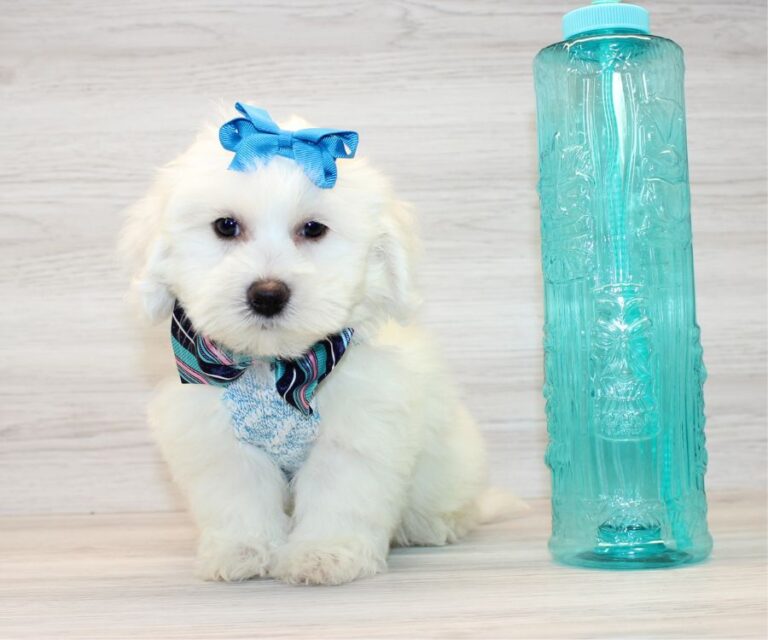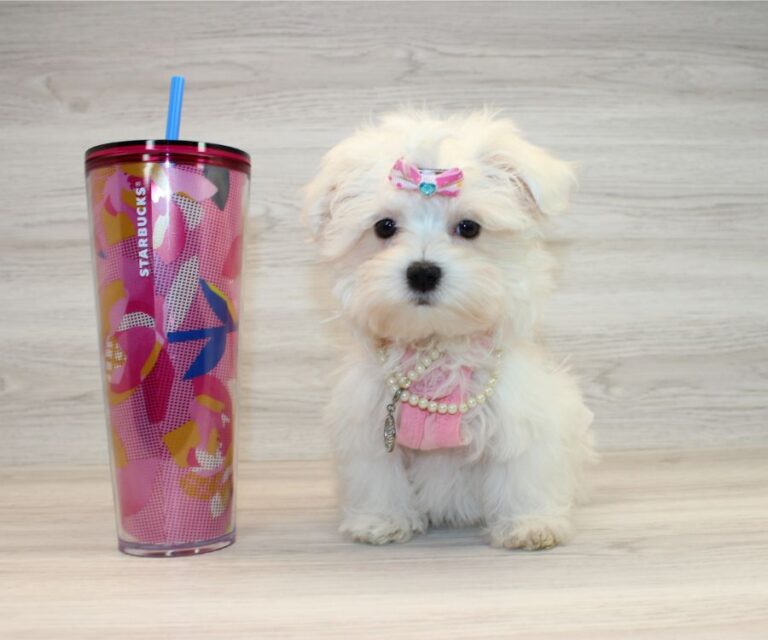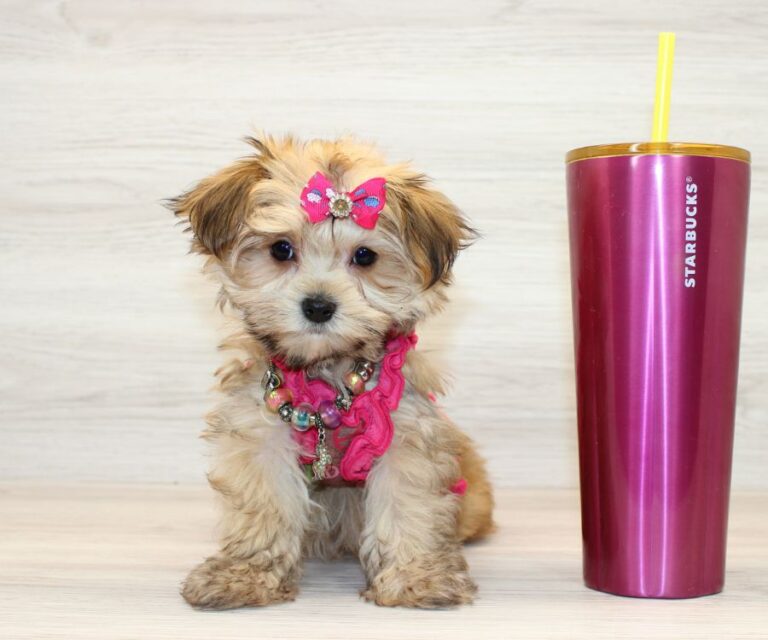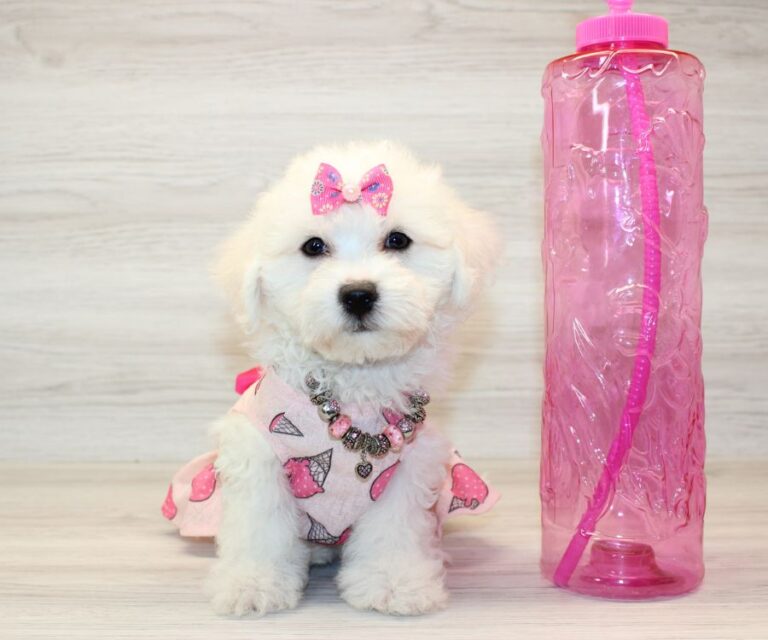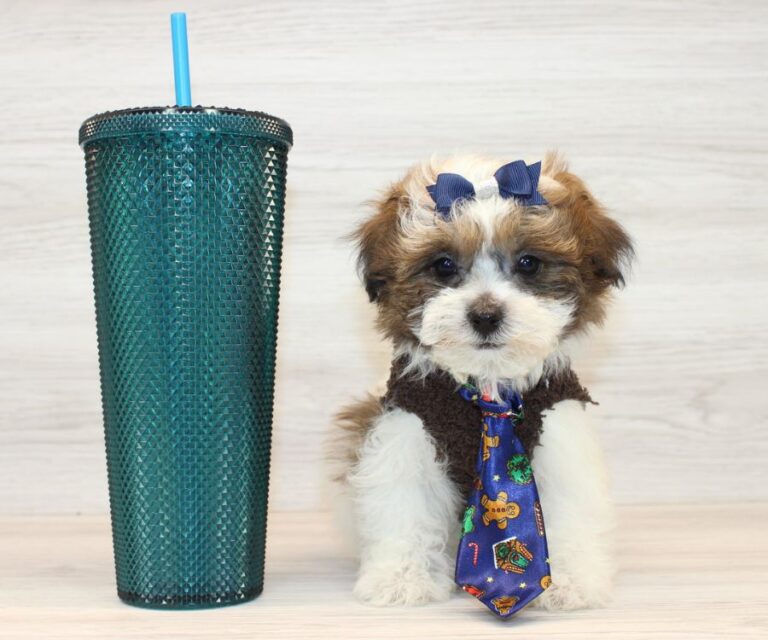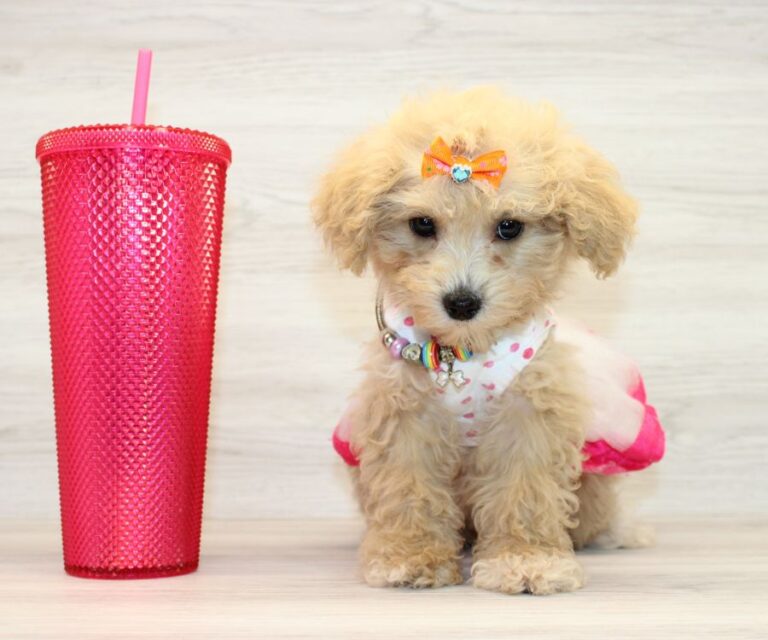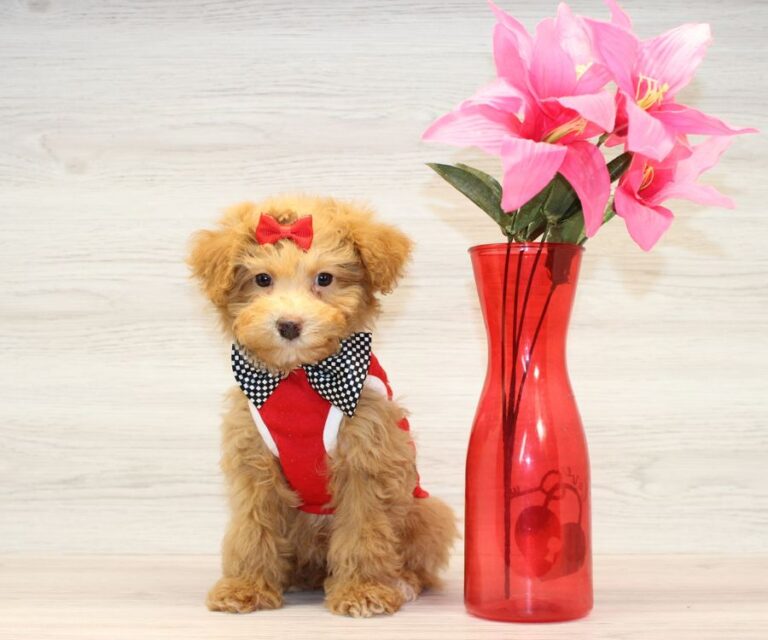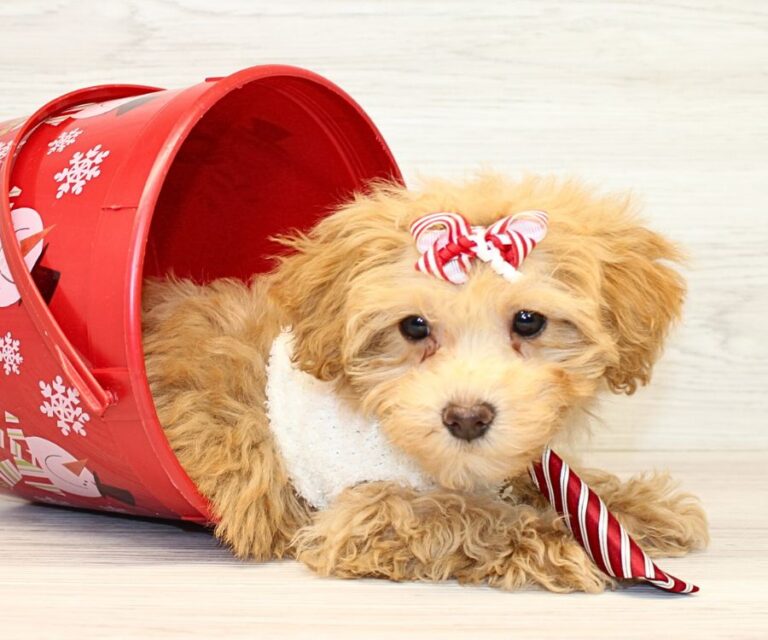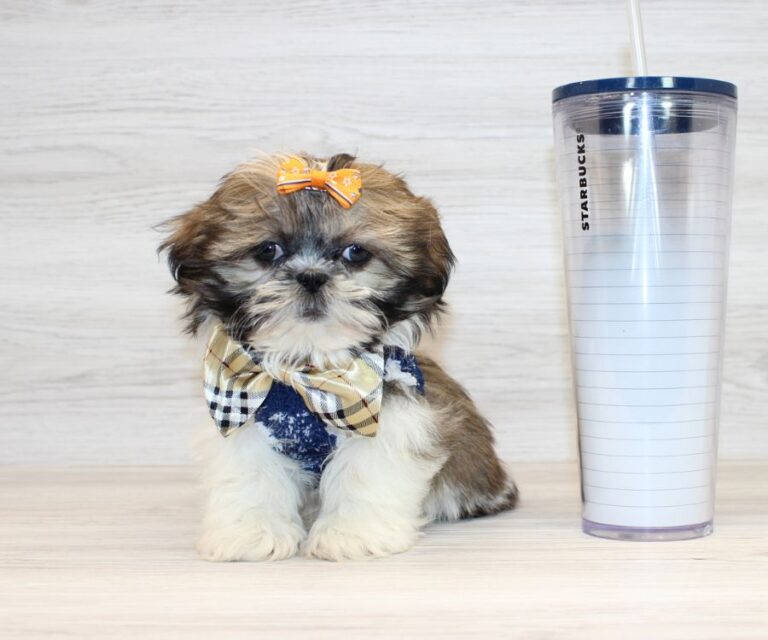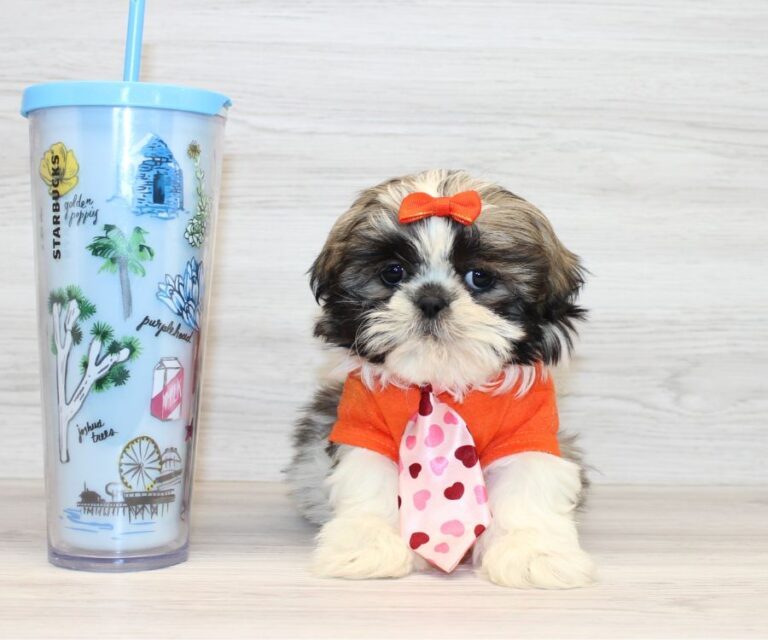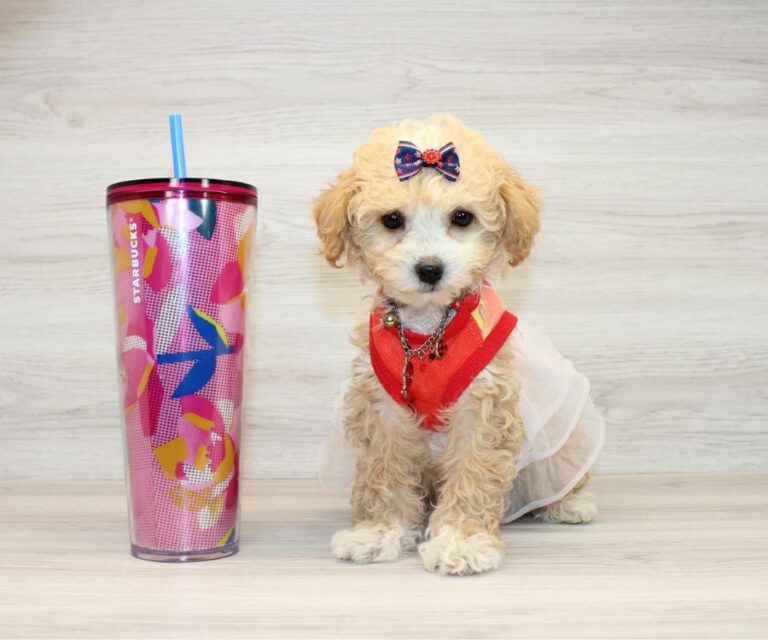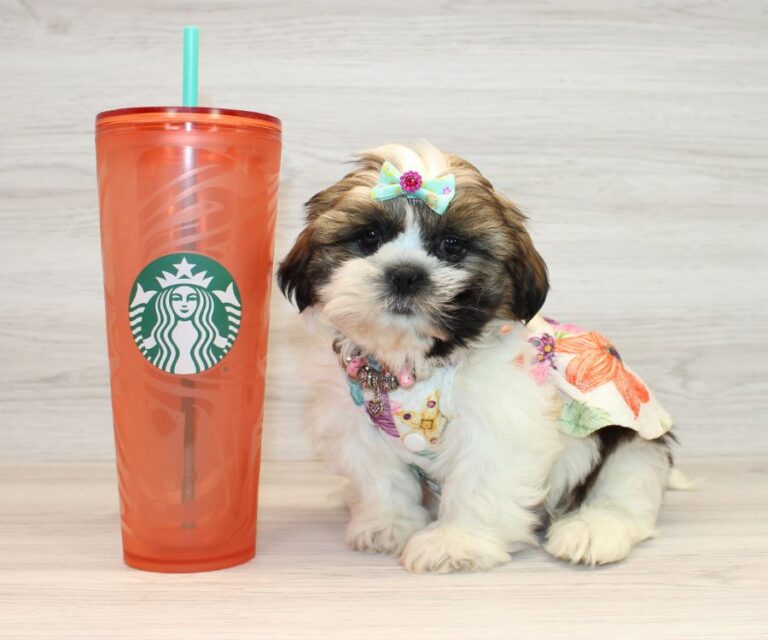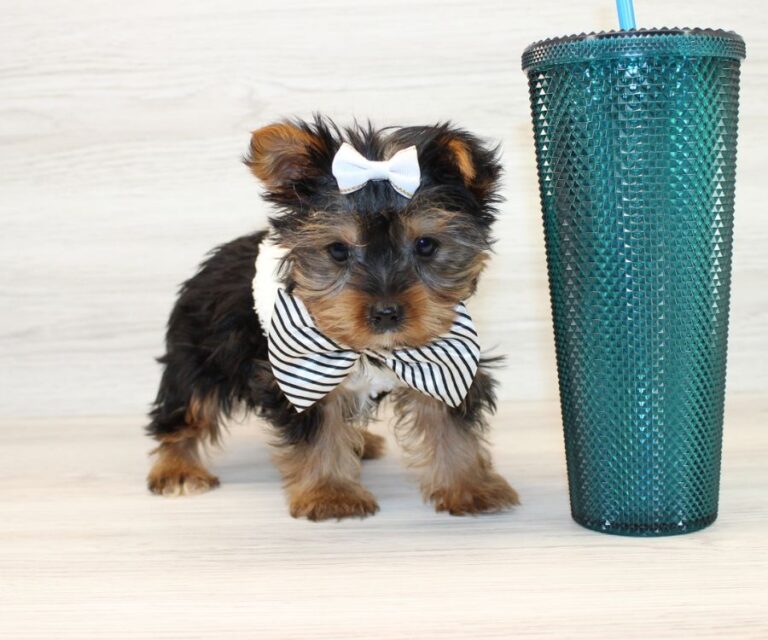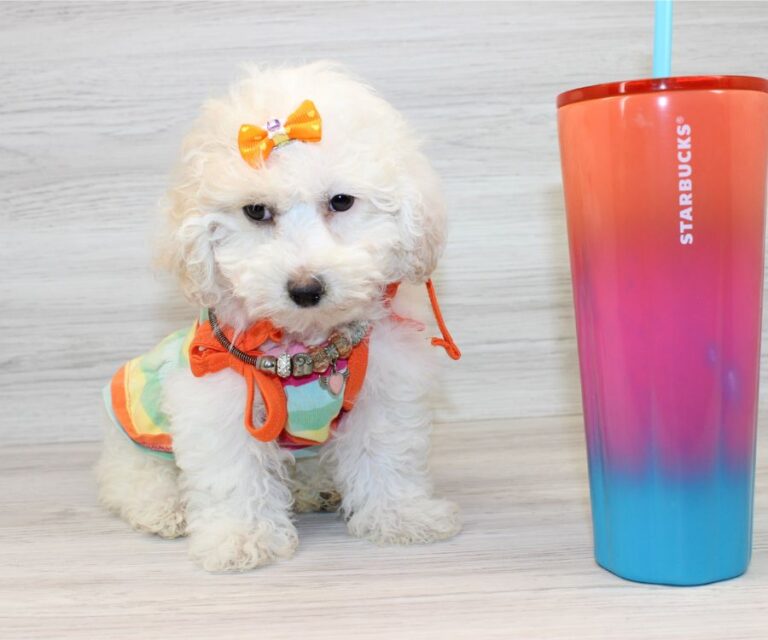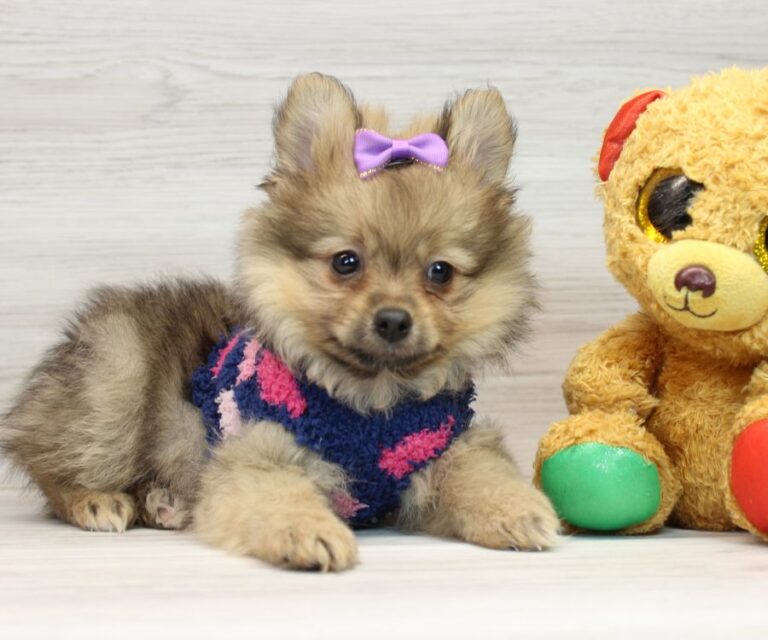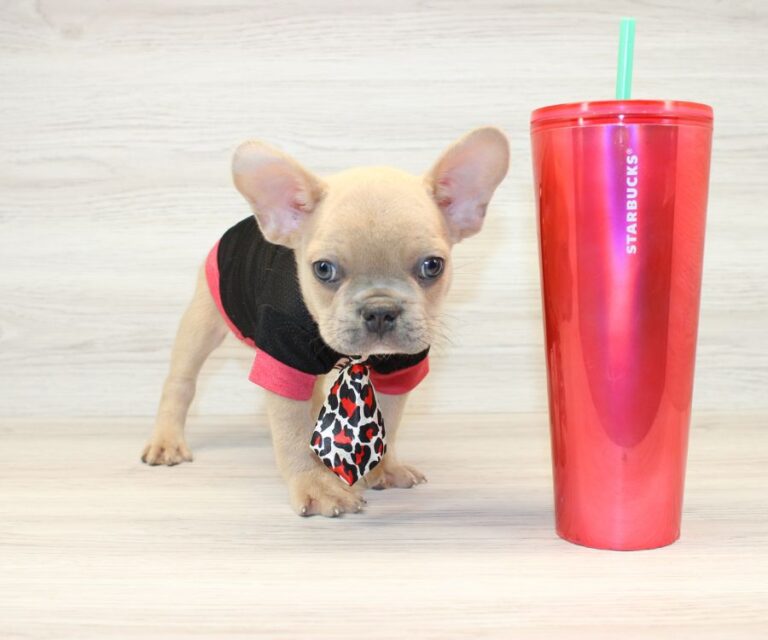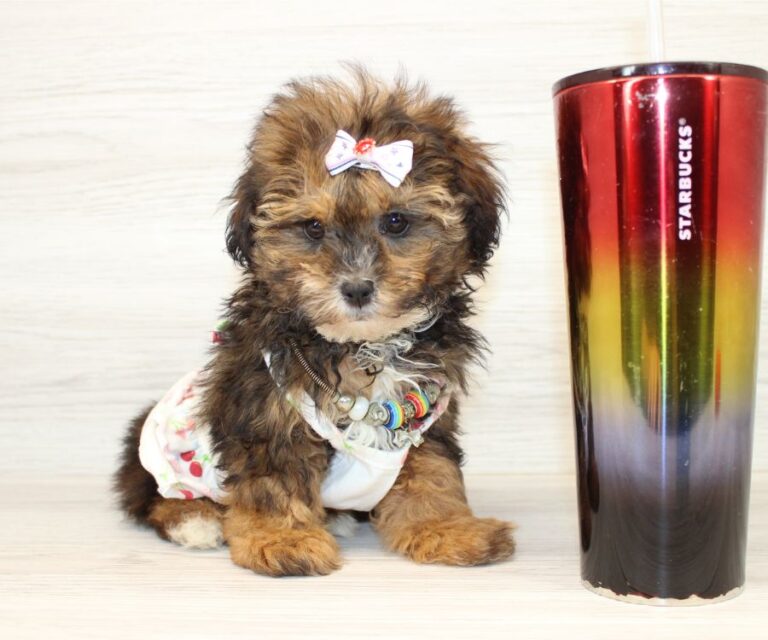If you’re seeking toy and teacup puppies in Hewitt, TX, Puppyheaven.com offers an array of breeds perfect for apartment living. Notable for their adaptability to small spaces, these puppies typically enjoy longer lifespans than larger breeds. Popular choices like Yorkshire Terriers and Pomeranians not only require less grooming but are also easier to transport. It’s important to take into account their specific healthcare needs, as smaller breeds often face unique challenges such as respiratory issues and fragile bones. Prioritizing regular veterinary visits is vital to maintaining their health. Exploring Puppyheaven’s selection and guidance could greatly enhance your puppy care strategy.
Why Choose Toy & Teacup Puppies?
Owning a toy or teacup puppy offers numerous benefits, including their adaptability to smaller living spaces and their extended lifespan compared to larger breeds. Their diminutive size makes them ideal for apartment living, where space is at a premium. You’ll find that these small dogs can thrive in confined areas, needing less room for exercise than their larger counterparts. This size suitability means they’re also easier to transport and handle, making trips and vet visits less stressful for both of you.
Moreover, the grooming needs of toy and teacup puppies are often less demanding than those of larger breeds. Due to their smaller surface area, they accumulate less dirt and debris. However, they do require regular grooming to maintain their coat’s health and to prevent matting, which can lead to skin issues. Regular grooming sessions also provide an excellent opportunity for bonding and can help you monitor their health more closely.
These breeds typically enjoy longer lifespans, giving you more years of companionship. Their manageable size and grooming requirements, combined with their adaptability, make toy and teacup puppies a wise choice for those who cherish the role of nurturing and caring for a pet.
Popular Breeds at Puppyheaven
As you explore the options at Puppyheaven, you’ll find that certain breeds consistently top the sales charts due to their size and temperament.
It’s important to take into account each breed’s specific health issues, as genetic predispositions can affect their overall wellbeing and care requirements.
Additionally, understanding the ideal living conditions for these breeds will help you determine if your home environment aligns with their needs for space, exercise, and social interaction.
Top-Selling Puppy Breeds
At Puppyheaven, several breeds consistently top the sales charts, including the Yorkshire Terrier and the Pomeranian. The enduring popularity of these breeds is influenced by factors such as size, temperament, and adaptability to various living environments.
Scientifically, smaller breeds like these are often preferred for their longer lifespan and lower maintenance costs compared to larger breeds. Pricing insights reveal that the initial cost of a teacup or toy breed can be higher due to their breeding complexities and high demand.
You’ll find that these breeds, while requiring a higher financial investment initially, often lead to longer-term satisfaction and lower cumulative care expenses. Understanding these factors can help you make a well-informed decision when choosing a puppy to serve your family’s needs and lifestyle.
Breed Health Considerations
When selecting a breed from Puppyheaven, it’s important to take into account specific health issues that may impact popular toy and teacup puppies. Respiratory problems in Pomeranians and fragile bones in Yorkshire Terriers are among the considerations. You should be mindful that these adorable pets often come with genetic predispositions that can influence their overall health and lifespan concerns.
For instance, Chihuahuas are prone to heart issues and patellar luxation, while Toy Poodles can suffer from progressive retinal atrophy, leading to blindness. It’s vital to bear in mind these health vulnerabilities to make sure you can provide the necessary care. Thorough knowledge of these predispositions will enable you to better serve these small companions, enhancing their quality of life and potentially extending their lifespan.
Ideal Home Environments
Ideal home environments for toy and teacup puppies typically include quiet, stable settings where frequent gentle handling and close human interaction can nurture their delicate physical and emotional needs.
You’ll want to take into account space considerations, ensuring your living environment accommodates these small breeds without risk of injury from oversized furniture or inaccessible areas.
Allergy awareness is also essential, as these puppies often demand hypoallergenic surroundings to support their health. It’s important to provide a clutter-free area that minimizes dust and other allergens that can affect both your health and your puppy’s well-being.
Health Considerations for Small Dogs
Considering their diminutive size, small dogs often face unique health challenges that require careful management and preventative care. You need to be aware that their genetic predispositions can greatly influence their overall well-being. For instance, many small breeds are prone to congenital heart defects, luxating patella, or hypoglycemia. These conditions are often inheritable and can impact their quality of life.
Moreover, their exercise limitations must be understood to avoid exacerbating existing health issues or causing new ones. While it’s important they remain active to prevent obesity—a common problem in small breeds—overexertion can lead to joint injuries or cardiovascular stress. It’s essential to tailor their physical activities to suit their specific needs, which might mean shorter, more frequent walks rather than extended periods of intense exercise.
You’ll also find that maintaining a regular veterinary check-up schedule is crucial. Early detection of issues such as dental problems, which are prevalent in small dogs due to their compact jaw structure, can prevent more severe health issues later on. Additionally, consistent monitoring for signs of distress or discomfort can help you catch potentially life-threatening conditions early, ensuring your little companion remains healthy and vibrant.
Tips for First-Time Puppy Owners
As a first-time puppy owner, you’ll need to understand the fundamentals of puppy training. This includes establishing consistent commands and employing positive reinforcement techniques. You must also prioritize your puppy’s health care. Ensure vaccinations, parasite prevention, and regular veterinary check-ups are scheduled.
Additionally, developing a strong bond with your puppy through daily interaction and gentle handling is essential for their emotional and social development.
Puppy Training Basics
When you first bring a puppy home, it’s important to start training immediately to establish good behaviors and social skills. Implementing structured housebreaking schedules is vital. Typically, puppies need to relieve themselves upon waking, after eating, and after playtime. Set a consistent routine, taking your puppy to a designated spot every two hours. Praise and reward them immediately after they’ve successfully done their business outside, reinforcing positive behavior.
Crate training methods are equally essential for safety and comfort. Introduce your puppy to a crate gradually. Start by placing their meals inside, and slowly increase the time they spend in the crate with the door closed. Make sure the crate is a positive space, equipped with comfortable bedding and a toy.
Health Care Essentials
For the best health and well-being of your puppy, schedule their first veterinary visit within a week of adoption. During this visit, you’ll begin a vaccination schedule critical for preventing diseases like parvovirus, rabies, and distemper. These vaccines are administered at strategic intervals during the first year of life to maximize immune response and protection.
Equally important is investing in appropriate grooming tools. For toy and teacup breeds, gentle brushes designed for fine, delicate fur can prevent matting and skin irritation. Regular grooming not only maintains coat health but also provides an opportunity to check for abnormalities such as bumps or lacerations, ensuring early detection and treatment. Prioritize these practices to guarantee a healthy, vibrant life for your new companion.
Bonding With Your Puppy
Establishing a strong bond with your new puppy is essential for their emotional and psychological development. Engaging in regular interactions, such as puppy playdates, fosters social skills and emotional resilience. These gatherings allow your puppy to learn appropriate behavior from their peers, enhancing their ability to cope with various social situations.
Additionally, consistent training sessions reinforce your connection, teaching your puppy to trust and rely on you as their guide. This mutual understanding is important for their overall wellbeing. Remember, the quality of the time you spend together greatly influences your puppy’s emotional development.
Dedicate time each day to actively engage with your puppy, ensuring these moments are positive and reinforcing their trust in you.
Puppy Training Essentials
Training your toy or teacup puppy consistently is essential for their cognitive development and behavioral adjustment. Establishing a structured training schedule early on fosters a routine that supports predictability and security, important for their mental well-being. Start with simple commands like ‘sit’ and ‘stay’, gradually increasing complexity as they master each task. This progressive learning stimulates their brain, enhancing neural connections which are necessary for their cognitive functions.
Implementing a reward system plays a pivotal role in this training process. Positive reinforcement, such as treats or verbal praise, effectively motivates your puppy and reinforces their learning. Scientific studies indicate that puppies respond better to rewards, thereby accelerating their learning and adaptation behaviors. Consistency in rewards ensures that your puppy associates the positive reinforcement with the correct action, promoting quicker and more effective learning.
It’s also important to tailor the training sessions to your puppy’s attention span. Toy and teacup breeds often have shorter attention spans, so keep training periods brief but frequent. This approach prevents them from becoming overwhelmed and ensures they remain engaged. Remember, patience and persistence are key in nurturing a well-behaved and cognitively healthy puppy.
How to Socialize Your Puppy
To effectively socialize your toy or teacup puppy, introduce them to a variety of people, environments, and other animals from an early age. Early socialization is important, as it helps prevent behavioral issues later in life by exposing your puppy to various stimuli, thereby reducing fear and anxiety. Arrange puppy playdates to encourage interaction with other dogs, which is essential for developing social skills.
During these playdates, focus on behavior observation to understand and guide your puppy’s interactions. Note their responses to different situations and animals, which will help you identify any signs of distress or aggression early on. This proactive approach allows you to intervene and correct undesirable behaviors promptly.
Ensure these interactions occur in controlled settings where all animals are vaccinated and healthy to prevent disease transmission. Gradually increase the complexity of the social scenarios as your puppy becomes more comfortable and confident. This progression is important for building a well-rounded, sociable dog.
The Best Puppy Diet Plans
After guaranteeing your puppy is well-socialized, it’s equally important to focus on providing them with a nutritious diet tailored to their specific needs. Toy and teacup puppies, due to their diminutive size and high metabolic rates, require specially formulated diets that promote healthy growth without leading to obesity.
You’ll want to establish a feeding schedule that suits their small stomachs, typically involving multiple small meals throughout the day. For puppies, three to four meals daily until they’re six months old is advisable. This not only supports their energy needs but also stabilizes their blood sugar levels.
When selecting a diet, consider the risk of puppy allergies. These can manifest through symptoms like itching, digestive issues, or poor coat quality. Opting for hypoallergenic foods that avoid common allergens such as beef, chicken, and wheat can be beneficial. Instead, look for novel proteins like venison or duck and carbohydrates like sweet potatoes or peas.
Always ensure the food you choose is high in essential nutrients like DHA for brain development, calcium for bone growth, and balanced omega fatty acids for a healthy coat and skin. Consulting with a pet nutritionist can provide personalized guidance to meet your puppy’s specific dietary needs, ensuring they grow up healthy and happy.
Finding the Right Veterinarian
When selecting a veterinarian for your toy or teacup puppy, you must verify their qualifications, ensuring they’re certified by a recognized veterinary association.
Consider the availability of emergency care options, as smaller breeds can require urgent attention for sudden health issues.
Also, familiarize yourself with their routine health protocols to guarantee consistent, science-based medical treatment for your puppy.
Veterinarian Qualifications Check
Ensuring your toy or teacup puppy’s health starts with selecting a veterinarian who holds the proper qualifications and experience. You must prioritize veterinary accreditation and license verification. This guarantees the vet you choose adheres to the highest standards of veterinary care, mandated by authoritative bodies.
Check if they’re accredited by recognized institutions such as the American Animal Hospital Association (AAHA) which sets rigorous benchmarks for veterinary practices. Additionally, verify their license status through your state’s veterinary medical board website, confirming they’re legally certified to practice.
This step is essential, not only to guarantee expert care for your puppy but also to foster a trusted relationship between you and your veterinarian, essential for the ongoing health and wellbeing of your beloved pet.
Emergency Care Options
Before selecting a veterinarian for your toy or teacup puppy, consider their ability to provide emergency medical care, making sure they’re equipped to handle urgent health issues that may arise.
Here are important factors to look for:
- Availability of Emergency Hotlines: Make sure they offer 24/7 access to emergency advice and support.
- After Hours Clinics: Check if there’s a facility nearby that accepts patients outside of normal business hours.
- Equipment and Facilities: The clinic should be outfitted with the necessary technology for emergency diagnostics and treatment.
- Staff Training: Confirm that the staff has specific training in handling small breed emergencies.
Choosing the right vet involves more than just location; it’s about ensuring they’re prepared to offer immediate care when your puppy needs it most.
Routine Health Protocols
In addition to emergency services, you must also evaluate a veterinarian’s routine health protocols to make certain your toy or teacup puppy receives thorough preventive care. It’s important to ask about the vaccination schedule tailored to your puppy’s specific needs, considering their diminutive size and distinct health requirements.
A proper schedule should protect against core diseases while considering the timing and dosages appropriate for smaller breeds. Similarly, inquire about parasite prevention strategies. These should include regular screenings and treatments for both internal and external parasites, using formulas that are safe for smaller dogs.
Effective management of these health aspects is essential in safeguarding your puppy’s well-being and ensuring a robust start in life.
Puppyheaven’s Adoption Process
Puppyheaven’s adoption process requires you to complete a detailed application form to assess your suitability as a potential pet owner. This methodical approach guarantees that each puppy is placed in a caring and appropriate home. The process is structured around several key application steps, helping you understand the commitment involved.
Here’s what you’ll need to navigate through the adoption stages:
- Initial Inquiry: You’ll provide basic personal information and specify your interest in a toy or teacup puppy.
- Home Environment Assessment: This step evaluates the safety and suitability of your home environment for a small puppy.
- Personal Interview: Puppyheaven conducts an interview to discuss your lifestyle, experience with pets, and expectations.
- Adoption Fee Agreement: You’ll review and agree to the adoption fees, which cover vaccinations, microchipping, and spay/neuter procedures.
Adoption fees are essential as they fund the extensive care Puppyheaven provides before adoption, ensuring puppies are healthy and well-socialized. It’s imperative you’re prepared for the responsibility of pet ownership, which extends far beyond the initial adoption. This thorough process is designed not just to protect the puppies but also to support you as a new owner, ensuring a harmonious relationship from the start.
Happy Stories From New Owners
Many new owners share touching testimonials about how their toy or teacup puppies have enriched their lives, demonstrating the profound impact these small pets can have on human well-being. Research supports the notion that the companionship of a dog can greatly decrease stress levels and enhance mood through the release of oxytocin, often referred to as the ‘cuddle hormone.’ These benefits are particularly pronounced among individuals who’ve adopted toy and teacup breeds, whose manageable size and affectionate nature make them ideal companions.
Owner testimonials frequently highlight the joy and emotional support these puppies provide. For instance, one owner detailed how the adoption of a teacup poodle helped mitigate her symptoms of anxiety and loneliness, fostering a sense of security and companionship that was profoundly therapeutic. These narratives are common at adoption celebrations, where new owners gather to share their stories and experiences.
Moreover, scientific studies suggest that the presence of a small pet can promote physical activity and social interaction, which are essential components of mental and physical health. Therefore, adopting a toy or teacup puppy not only brings immediate joy but also contributes to long-term health benefits, making these tiny companions significant additions to one’s life.
Conclusion
Choosing a toy or teacup puppy from Puppyheaven in Hewitt, TX is more than just bringing home a new pet; it’s about adding a joyful, albeit tiny, new member to your family.
Remember, these small breeds require specific care and nutrition, and it’s important to follow vet-recommended guidelines to guarantee their health and longevity.
Embrace the journey of puppy parenthood armed with the right knowledge, and enjoy the countless happy moments and bonding with your new furry friend.

